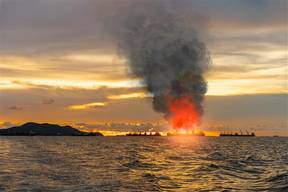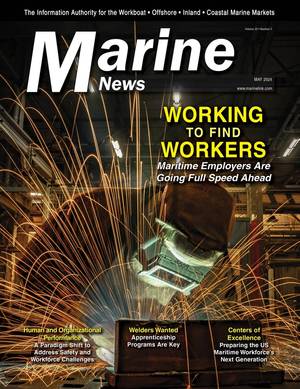Commissioning of Russia's 120MW Nuclear Icebreaker Postponed
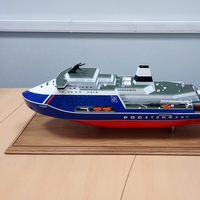
Russia is pushing back the commissioning of its planned 120 megawatt (MW) icebreakers, according to media reports.First Deputy Prime Minister of the Russian Federation Denis Manturov said the lead nuclear-powered icebreaker of Project 10510 Leader series, Rossiya, is scheduled to be comissioned in 2030, three years later than originally planned, Russian newspaper Kommersant reported. Construction has been underway at the Zvezda shipbuilding complex in the Russian Far East since 2020…
Fire Put Out on Nuclear-powered Cargo Ship
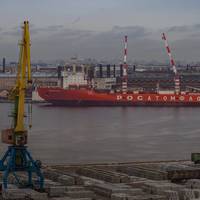
Russia said on Monday that emergency workers had put out a fire on a Soviet-era nuclear-powered cargo-icebreaker ship and the state company which runs the vessel said there had been no casualties and no threat to the security of the reactor.The fire broke out on Sunday in one of the cabins of the Soviet-made Sevmorput ship, which is currently at dock in the northern Russian city of Murmansk, the emergency ministry said.The fire, which at its peak covered an area of about 30 square meters (323 square feet)…
Will the Effort to Reach Zero Emissions Go Nuclear?
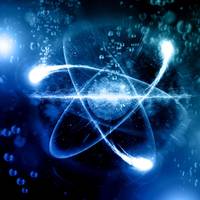
On December 8, 1953 President Dwight D. Eisenhower addressed the 470th Plenary Meeting of the United Nations General Assembly. The speech he delivered is often recognized as his effort to introduce “Atoms for Peace”, a program to move nuclear fission and technology away from weapons development and into clean energy.As a result of that effort and program, the NS Savannah was built and delivered as the first nuclear-powered merchant ship. She was built in the late 1950s at a cost of $46.9 million and launched on July 21, 1959.
ABS AIP for Floating Offshore Nuclear Power Barge

A design for a floating offshore nuclear power barge from HD Korea Shipbuilding & Offshore Engineering (KSOE) and KEPCO Engineering and Construction Company, Inc. (KEPCO E&C) received approval in principle (AIP) from ABS.Project collaborators include ABS, HD KSOE, KEPCO E&C and the Liberian International Ship & Corporate Registry (LISCR).The floating small modular reactor (SMR) barge is intended to serve as offshore power generation for remote communities and island electrification.
Fincantieri to Study Feasibility of SMR Technology in Shipping

Fincantieri, reactor developer newcleo and class society RINA have agreed to carry out a feasibility study for nuclear applications to the shipping industry, including newcleo’s lead-cooled small modular reactors (SMRs) technology.The deployment of newcleo’s lead-cooled fast reactor (LFR) for naval propulsion would involve placing a closed mini reactor on vessels as a small nuclear battery producing a 30MW electric output. This would require infrequent refuelling (only once every 10-15 years)…
ABS Study Explores Potential of Commercial Nuclear Propulsion
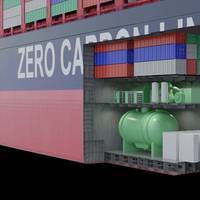
New research explores how nuclear propulsion could transform the design, operation and emissions output of vessels in the commercial maritime industry.Classification society ABS said it commissioned Herbert Engineering Corp. (HEC) to carry out the study to examine the potential of advanced modern reactor technology for commercial marine propulsion. The study is designed to help industry better understand the feasibility and safety implications of nuclear propulsion and to support future development projects.The study…
Managing Offshore Oil & Gas Through Energy Transition
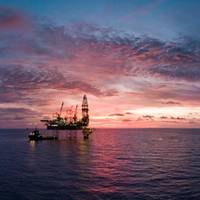
Scientists warn that climate change is the greatest peril that humankind has ever faced. Yet oil and gas exploration is set to clock the highest growth for more than a decade this year and next. Protesters cause disruption but, for the moment, hydrocarbon energy underpins life as we know it“Offshore oil and gas production probably matters now more than ever,” said Audun Martinsen. The Rystad Energy Partner and Head of Energy Research told Maritime Reporter & Engineering News.“It…
South Korean Partners to Develop Nuclear-powered Ships

A group of partners in South Korea has set out to develop, demonstrate and commercialize vessels powered by small modular reactors (SMR).Nuclear power for ships has been gaining interest amid stricter greenhouse gas emissions regulations in the international shipping sector.Nine participating institutions, including KAERI, Gyeongsangbuk-do, Gyeongju-si, Korea Research Institute of Ships and Ocean Engineering (KRISO), Korean Register (KR), H-Line Shipping Co., Ltd., HMM Co., Ltd., Wooyang Shipping Co., Ltd., Sinokor Merchant Marine Co., Ltd.
BV, ThorCon Developing Molten Salt Nuclear Power Barge
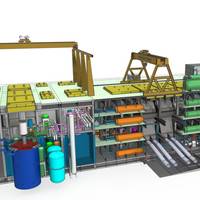
Testing, inspection and certification specialist Bureau Veritas and nuclear power technology developer ThorCon have entered an agreement for the technology qualification and the subsequent development of a 500-megawatt (MW) molten salt nuclear power barge for operations in Indonesia.The concept developed by ThorCon is a molten salt fission reactor that operates at low pressure and uses liquid fuel. The liquid fuel enables much higher operating temperatures, leading to greater…
Putin Touts Russia's 'Arctic Power' with Launch of Nuclear Icebreakers
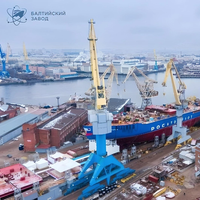
President Vladimir Putin on Tuesday touted Russia's Arctic power at a flag-raising ceremony and dock launch for two nuclear-powered icebreakers that will ensure year-round navigation in the Western Arctic.Presiding via video link from the Kremlin at the launch ceremony in the former imperial capital of St Petersburg in northern Russia, Putin said such icebreakers were of strategic importance for the country."Both icebreakers were laid down as part of a large serial project and are part of our large-scale…
Nuclear Energy Viable as Future Maritime Propulsion Option -C-Job
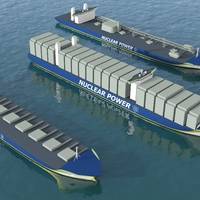
Nuclear energy could be applied and should be considered as a viable marine propulsion option in the future, according to independent ship design company C-Job Naval Architects.Based on new research shared on Tuesday, C-Job concludes that the Molten Salt Reactor has the most potential in the long term. The combination of passive safety, high burn-up, and the future potential to use the thorium cycle make it the best fit for maritime application. With thorium, the high-level nuclear waste longevity can be reduced from more than 10…
ABS, DOE to examine Nuclear Energy for Commerical Maritime
The U.S. Department of Energy (DOE) has awarded ABS a contract to research barriers to the adoption of advanced nuclear propulsion on commercial vessels.The $800,000 research project – awarded by the DOE’s Office of Nuclear Energy last year and formally contracted through its U.S. Industry Opportunities for Advanced Nuclear Technology Development funding opportunity – will address challenges to adopting new reactor technology in commercial maritime applications. ABS will develop models of different advanced reactor technologies for maritime applications and develop an industry advisory on the commercial use of modern nuclear power.Support will be provided by the Department of Energy’s National Reactor Innovation Center (NRIC), based at Idaho National Laboratory.
Marine Design: Ulstein Takes Aim at Zero Emission Cruise Ops with Ulstein Thor
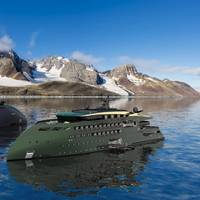
Ulstein today unveiled a vessel concept that it claims is capable of making the vision of zero emission cruise operations a reality. Dubbed Ulstein Thor, the 149m 3R (Replenishment, Research and Rescue) design will feature a Thorium Molten Salt Reactor (MSR) to generate vast amounts of clean, safe electricity. This enables the vessel to operate as a mobile power/charging station for a new breed of battery driven cruise ships.Ulstein believes Thor may be the missing piece of the zero emissions puzzle for a broad range of maritime and ocean industry applications.
Floating Power Plants: Is Nuclear the Key in the Net-zero Energy Transition?
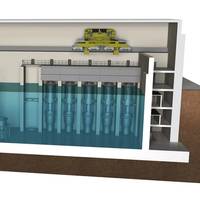
Floating nuclear power plants (FNPPs) may not immediately spring to mind as providing a solution to several of today’s key global challenges – but FNPP development is emerging as a means of decentralized stand-alone production of cost competitive hydrogen-based fuels and clean electricity and water, according to a new report by Intelatus Global Partners.The commercial case for deployment of FNPPs featuring small modular reactors is founded in the growing demand for hydrogen and…
Japan: Ocean Release for Fukushima Water
A panel of experts advising Japan's government on a disposal method for radioactive water from the destroyed Fukushima nuclear plant on Friday recommended releasing it into the ocean, a move likely to alarm neighboring countries.The panel under the industry ministry came to the conclusion after narrowing the choice to either releasing the contaminated water into the Pacific Ocean or letting it evaporate - and opted for the former. Based on past practice it is likely the government…
Fincantieri Wins $111Mn ITER Contract
Italian shipbuilding company has been awarded an order worth almost 100 million euros (about 111 million U.S. dollars) to provide high-profile equipment as part of the International Thermonuclear Experimental Reactor (ITER) project to build a nuclear fusion reactor.The ITER Project is a multinational collaboration aimed at building an experimental hydrogen fusion reactor, first of its kind, and acknowledged as one of the most ambitious initiatives in the world in the field of sustainable energy.A temporary consortium has been established for the execution of these activities. It includes Fincantieri itself as the main contractor, its subsidiary Fincantieri SI…
Russia's Floating Power Plant Plugged In
Russia’s state-owned nuclear company Rosatom said its floating nuclear power plant has been connected to the grid and has commenced electricity production for the first time in a remote region of Russia.The floating power unit (FPU) Akademik Lomonosov has been connected to the grid, generating electricity for the first time in the isolated Chaun-Bilibino network in Pevek, Chukotka, Russia’s Far East. This happened after the Russian regulator Rostekhnadzor issued an operations permit, as well as permission to connect to the northern electricity grid maintained by Chukotenergo JSC.Rosatom’s Director General Alexey Likhachev said: “After its connection to the grid, Akademik Lomonosov becomes the world’s first nuclear power plant based on SMR-class technology to generate electricity.
Seaborne Nuclear Power Plant Docks in Russia
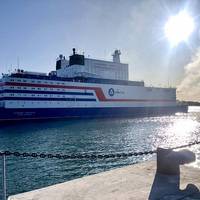
Russia's first-floating nuclear power plant has arrived to its permanent base near an isolated Russian town across the Bering Strait from Alaska, Russian state nuclear energy company Rosatom said on Saturday.Developed by Rosatom, the plant, known as "Akademik Lomonosov", set off on a 5,000 km (3,100 mile) journey on Aug. 23 through Arctic waters to reach the Chukotka region. Rosatom said it aims to make the floating station operational by the year-end. It would become the world's…



